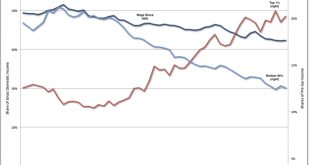Read More »
The Volatility Index and Heisenberg’s uncertainty principle
from Donald MacKenzie and the London Review of Books The VIX, or Volatility Index, is Wall Street’s fear gauge. I first started paying attention to it in the late 1990s. Back then, a level of around 20 seemed normal. If the index got to 30, that was an indication of serious market unease; over 40 signalled a crisis. The highest the VIX ever got was during the 1987 stockmarket crash, when it reached 150. In the 2008 global banking crisis, it peaked at just below 90. The US economy has...
Read More »Neoclassical economics is great — if it wasn’t for all the caveats!
from Lars Syll I think that modern neoclassical economics is in fine shape as long as it is understood as the ideological and substantive legitimating doctrine of the political theory of possessive individualism. As long as we have relatively-self-interested liberal individuals who have relatively-strong beliefs that things are theirs, the competitive market in equilibrium is an absolutely wonderful mechanism for achieving truly extraordinary degree of societal coordination and...
Read More »What Martin Sandbu gets wrong about neoclassical macro-economics
Martin Sandbu is, in the Financial Times, wrong about neoclassical macroeconomic models. Let me explain by responding to his text, paragraph by paragraph. No links, I might add these later. What do macroeconomists actually do? Without an answer to that question, it is difficult to articulate what they might be doing wrong. The rebuilding macroeconomic theory project is useful also to non-economists — perhaps especially to them — because it takes the time to dwell on how macroeconomists do...
Read More »What’s the matter with America?
from David Ruccio Last week, Thomas Frank welcomed Paul Krugman to the ranks of those who believe that the American working-class in recent decades has often voted against its fundamental economic interests by supporting conservative Republicans. Appropriately enough, Frank then chastises Krugman for having repeatedly used his New York Times column to argue exactly the opposite, denying the idea that working-class Americans had defected to the Republican Party. Frank, the author...
Read More »Open thread Jan. 16, 2017
France called ……………….they want their statue back
Simon Wren-Lewis — anti-pluralist mainstream flimflam defender
from Lars Syll Again and again, Oxford professor Simon Wren-Lewis rides out to defend orthodox macroeconomic theory against attacks from heterodox critics. In his latest attack on heterodox economics and students demanding pluralist economics education he writes: The danger in encouraging plurality is that you make it much easier for politicians to select the advice they like, because there is almost certain to be a school of thought that gives the ‘right’ answers from the politicians...
Read More »Former AIG director Martin Feldstein warns of stock and housing bubbles
from Dean Baker That’s one of the things we learn from reading Robert Samuelson’s Washington Post columntoday, although Samuelson identifies Feldstein only by his professorship at Harvard, not his moonlighting work on AIG’s board. (In addition to requiring a massive government bailout during Feldstein’s tenure as a director, AIG was also rocked by an accounting scandal that forced the resignation of its Maurice Greenberg, its longtime CEO.) I’m one of those old-fashioned types who think...
Read More »Interview with Jamie Galbraith
Via Marketwatch Jamie Galbraith states his thoughts on a how the current US economy functions. Here are a few snippets: University of Texas economist Galbraith, the son of the famous Harvard economist John Kenneth Galbraith, believes mainstream economists and the Federal Reserve are too wedded to old ideas to see what is really going on in the economy. Specifically, Galbraith is worried that the consumer is the only game in town — and that can’t last....
Read More » Heterodox
Heterodox



